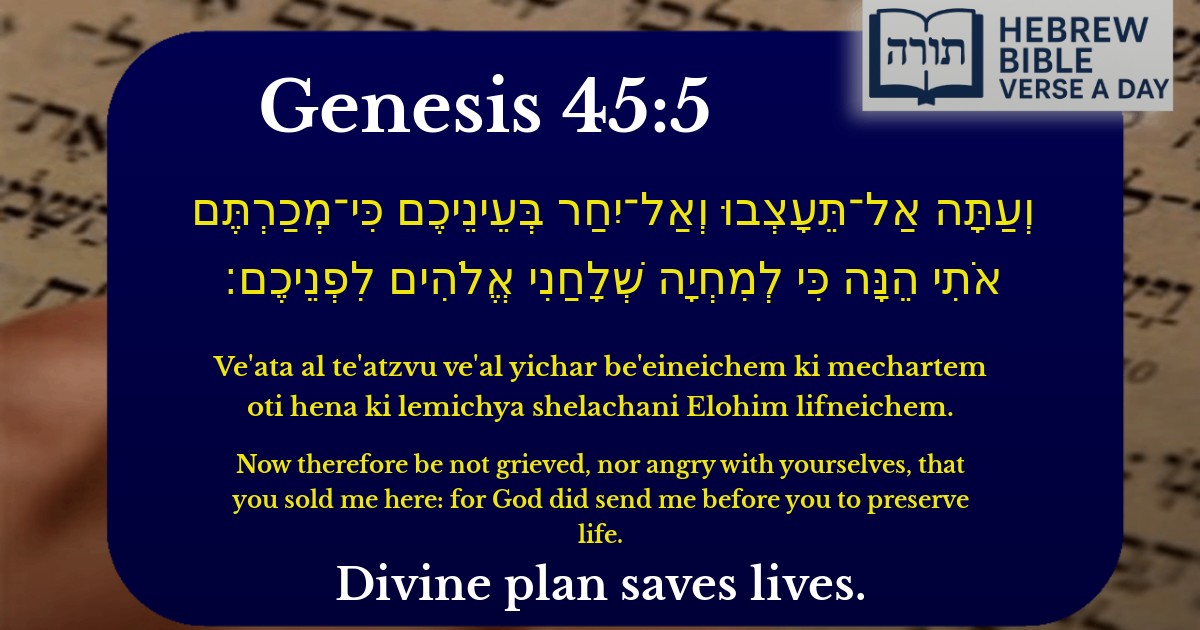Join Our Newsletter To Be Informed When New Videos Are Posted
Join the thousands of fellow Studends who rely on our videos to learn how to read the bible in Hebrew for free!
Hebrew Text
וְעַתָּה אַל־תֵּעָצְבוּ וְאַל־יִחַר בְּעֵינֵיכֶם כִּי־מְכַרְתֶּם אֹתִי הֵנָּה כִּי לְמִחְיָה שְׁלָחַנִי אֱלֹהִים לִפְנֵיכֶם׃
English Translation
Now therefore be not grieved, nor angry with yourselves, that you sold me here: for God did send me before you to preserve life.
Transliteration
Ve'ata al te'atzvu ve'al yichar be'eineichem ki mechartem oti hena ki lemichya shelachani Elohim lifneichem.
Hebrew Leining Text
וְעַתָּ֣ה <b>׀</b> אַל־תֵּעָ֣צְב֗וּ וְאַל־יִ֙חַר֙ בְּעֵ֣ינֵיכֶ֔ם כִּֽי־מְכַרְתֶּ֥ם אֹתִ֖י הֵ֑נָּה כִּ֣י לְמִֽחְיָ֔ה שְׁלָחַ֥נִי אֱלֹהִ֖ים לִפְנֵיכֶֽם׃
וְעַתָּ֣ה ׀ אַל־תֵּעָ֣צְב֗וּ וְאַל־יִ֙חַר֙ בְּעֵ֣ינֵיכֶ֔ם כִּֽי־מְכַרְתֶּ֥ם אֹתִ֖י הֵ֑נָּה כִּ֣י לְמִֽחְיָ֔ה שְׁלָחַ֥נִי אֱלֹהִ֖ים לִפְנֵיכֶֽם׃
🎵 Listen to leining
Parasha Commentary
📚 Talmud Citations
This verse is quoted in the Talmud.
📖 Chagigah 4b
The verse is referenced in a discussion about divine providence and how God's plans unfold through human actions, using Joseph's words to his brothers as an example.
📖 Megillah 16b
The verse is cited in a discussion about the concept of divine intervention in human affairs, illustrating how Joseph recognized God's hand in his journey to Egypt.


Context of the Verse
This verse (Bereshit 45:5) is part of Yosef's emotional revelation to his brothers in Egypt, where he reassures them after they recognize him as the brother they had sold into slavery years earlier. Yosef emphasizes that their actions were part of a divine plan to ensure survival during the famine.
Yosef's Perspective on Divine Providence
Rashi explains that Yosef is teaching his brothers a fundamental principle of hashgachah pratit (divine providence): although they acted with wrongful intent, Hashem orchestrated events for a greater purpose—to sustain the family during famine. The phrase "לְמִחְיָה" ("to preserve life") underscores that their survival was the ultimate goal.
The Brothers' Emotional State
The Sforno notes that Yosef tells his brothers not to be grieved ("אַל־תֵּעָצְבוּ") or angry with themselves ("אַל־יִחַר בְּעֵינֵיכֶם") because their regret, while justified, should not overshadow the recognition of Hashem's hand in the events. The Ramban adds that Yosef alleviates their guilt by framing their actions as part of a divine plan.
Theological Implications
Midrashic Insights
The Midrash Tanchuma (Vayigash 8) elaborates that Yosef's descent to Egypt was a precursor to the eventual exile and redemption of Bnei Yisrael. His reassurance to his brothers reflects the idea that hardships are sometimes necessary steps in Hashem's larger plan for the Jewish people.